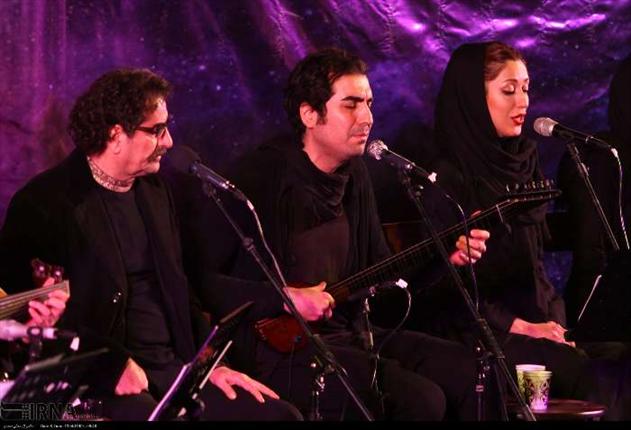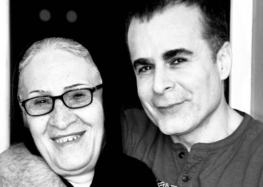Iran’s Beleaguered Music Community Urges Rouhani to Prevent Concert Cancellations

Contemporary Iranian music singers Shahram Nazeri (left) and Hafez Nazeri (middle) perform at a concert.
Members of Iran’s music industry are urging President Hassan Rouhani to follow through on his 2017 election campaign promise to uphold citizens’ rights by preventing the cancellation of state-sanctioned concerts.
The most recent appeal was issued to the president in a letter signed by members of the House of Music, an independent association of musicians based in Tehran, on August 2, 2017 following the cancellation of a concert by a renowned vocalist.
“Fortunately, ever since accepting the heavy responsibility of being a president, you have raised the issue of citizens’ rights and the need for all to enjoy and defend their legitimate rights,” said the letter. “This has been reassuring and a great source of hope for many, especially in the music industry.”
“Presently, the question is: Are the cancellations of lawful concerts not a clear example of the violation of the rights of musicians as citizens? Who is accountable for the trampling of these rights?” asked the signees.
“The government should be transparent in its support for artists by exposing and prosecuting pressure groups and agents responsible for preventing concerts,” added the letter.
The letter also called on Rouhani, who was inaugurated for his second term on August 3, to nominate someone to head the Ministry of Culture and Islamic Guidance who “understands art and will defend artists.”
Another letter signed by more than 500 artists and producers in Iran’s music industry was sent to the president on July 31.
“Preventing licensed musical performances is clearly breaking the law and an act of sabotage in the country’s affairs and the perpetrators must be prosecuted,” said the letter.
Since 2013, when Rouhani was voted into office promising a more open society, numerous musicians, including popular singers Alireza Ghorbani and Sirvan Khosravi, saw their concerts canceled at the last moment.
All of the cancelled concerts had received licenses from the Ministry of Culture and Islamic Guidance.
Religious conservatives have justified their attacks on musicians by quoting vague statements and decrees by senior religious leaders. Iran’s supreme leader, Ali Khamenei, has himself often warned about the alleged dangers of music, saying it will “lead people away from the path of God.”
The latest concert cancellation in Iran took place in Quchan, Khorasan Razavi Province in northeastern Iran, where the famous contemporary Iranian music singer Shahram Nazeri and his son Hafez Nazeri were due to perform on July 28.
“In the past few days, event organizers were repeatedly notified that the chosen venue was inappropriate for a concert that disrespects the sentiments of artists as well as the people of Quchan,” said local prosecutor Ramazanali Azari on August 3, according to the state-funded Islamic Republic News Agency (IRNA).
“The venue was sealed after our concerns went unheeded,” he claimed without explaining how the concert, which had not occurred yet, “disrespects” people.
The Workers Sports Arena in the Yaghoubabad neighborhood of the city was chosen for the concert because it has the best acoustics, said the organizers, according to the IRNA article.
The Nazeris were also prevented from holding a concert in Neyshabour, Khorasan Razavi Province, in May 2016 despite having obtained a license from the Ministry of Culture and Islamic Guidance.
During Rouhani’s first term (2013-17), dozens of musical performances were cancelled by state authorities, often at the last minute, after local authorities bowed to pressure imposed by religious conservatives.
This occurred despite Rouhani’s repeated claims that he supports Iran’s musical community.
“One of the outcomes of this year’s elections was that everyone was at peace with music,” said Rouhani at a press conference on May 22, 2017, three days after winning the presidential election.
“However, we are not too fond of cheap music,” he jokingly added. “Some say that’s fine as well, but in any case, I am certain our new government will give more support to the cultural community.”






